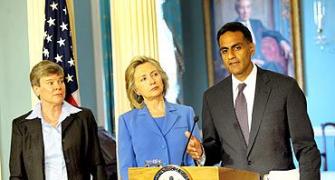 A series of actions by India over the last year, including not signing a deal on the Iran-Pakistan-India gas pipeline, signal New Delhi's steps to join the US-led efforts "to shut Iran out of the international financial system", a Congress report says.
A series of actions by India over the last year, including not signing a deal on the Iran-Pakistan-India gas pipeline, signal New Delhi's steps to join the US-led efforts "to shut Iran out of the international financial system", a Congress report says. The Congressional Research Service (CRS) in its latest report prepared for US lawmakers, many of whom had in the past voiced concerns over India-Iran ties said that steps taken in late 2010 to prevent some banking transactions with Iran, could suggest that New Delhi is now cautious about any expansion of energy or other commercial relations with Iran.
"Previously, the threat of imposition of US sanctions had not dissuaded Indian firms from taking some equity stakes in various Iranian energy projects," said the report by CRS, which is a bi-partisan research wing of the US Congress.
CRS said India was almost out of the $7 billion Iran-Pakistan-India gas pipeline project. "India did not sign a memorandum between Iran and Pakistan finalising the deal on June 12, 2010.
"India reportedly has been concerned about the security of the pipeline, the location at which the gas would be officially transferred to India, pricing of the gas, tariffs, and the source in Iran of the gas to be sold," it said.
Former Secretary of State Condoleezza Rice on several occasions had "expressed US concern" about the pipeline deal or called it "unacceptable".
Possibly contributing to India's hesitancy to move forward, US' Af-Pak envoy, the late Richard Holbrooke, during his 2010 trips to Pakistan, raised the possibility that the project could invite sanctions if it is undertaken, it said.
CRS
During high-level economic talks in early July 2010, Iranian and Indian officials reportedly raised the issue of constructing an underwater natural gas pipeline, which would avoid going through Pakistani territory.
However, such a route would presumably be much more expensive to construct than would be an overland route, it said.
India has generally been considered friendly towards Iran and it seemed unlikely to impose any national sanctions on that country, the report said.
"Therefore, many experts were surprised when India's central bank, in late December 2010, announced that it would no longer use a regional body, the Asian Clearing Union, to handle transactions with Iran," CRS said.
The Asian Clearing Union, based in Tehran, was set up in the 1970s by the United Nations to ease commerce among Asian nations.
There have been allegations in recent years that Iran might be using the Clearing Union to handle transactions so as to avoid limitations imposed by European and other banks.
"The Indian move complicated India's purchases of about 350,000-400,000 barrels per day of Iranian oil, and Indian officials subsequently undertook negotiations with Iran to find an alternate mechanism to clear Indian payments for that oil and other Iranian goods," it said.
"Still, the Indian move - and the reported difficulty in agreeing to a replacement payments mechanism - appeared to signal that India was taking steps to join US/European-led efforts to shut Iran out of the international financial system," CRS said, pointing out that the Indian move followed President Barack Obama's visit in November 2010.






